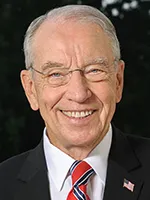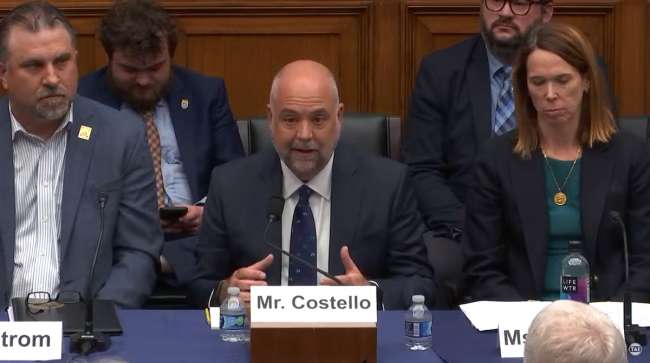“Directly or indirectly, virtually all trucking companies are victims of cargo theft,” ATA Chief Economist Bob Costello said during a roundtable hosted by the House T&I Committee. (Committee on Transportation and Infrastructure)
WASHINGTON — Freight industry stakeholders renewed calls for senior policymakers to advance legislation designed to respond to long-standing cargo theft concerns.
American Trucking Associations recently joined groups representing railroad operators, logistics firms and retailers in pressing for consideration of the bipartisan and bicameral Combating Organized Retail Crime Act.
Specifically, the legislation would facilitate the establishment of a multiagency unit that would be equipped with a road map for eliminating retail theft operations.
“Directly or indirectly, virtually all trucking companies are victims of cargo theft. Either they are victims of crime, or they are spending so much money to defend against being targeted that they are still victims,” said ATA Chief Economist Bob Costello. According to ATA’s background on the issue, cargo theft is often associated with supply chain disruptions and raises risks to the freight workforce.
“ATA looks forward to working with committee members to safeguard the entire supply chain, including trucking, to protect businesses and their employees as well as lower costs for consumers,” Costello added.
He shared ATA’s perspective with senior policymakers during a roundtable panel hosted by the House Transportation and Infrastructure Committee on April 29.

Reinke
Intermodal Association of North America, which promotes the contributions from logistics providers, also was represented at the session.
“It’s getting those perpetrators off the streets so they don’t do the crimes over and over again,” Anne Reinke, CEO of IANA, told the panel. “We all have a role to play in terms of information sharing, data gathering, and so our members are investing in it. As Mr. Costello said, if you don’t invest in it, you’re going to lose your business and some of our members have.”
Rodney Davis, a former Republican congressman from Illinois, is a senior official with the U.S. Chamber of Commerce. An approach for reducing cargo theft, Davis insisted, requires a “combined federal, state and local nexus to really make an impact.”
Brian Antonellis of Fleet Advantage and TMC General Chairman Radu Mihai discuss the need for targeted training programs for heavy-duty technicians that build a capable, future-ready workforce. Tune in above or by going to RoadSigns.ttnews.com.
Reps. Daniel Webster (R-Fla.) and Dina Titus (D-Nev.), chairman and ranking member of the Railroads, Pipelines, and Hazardous Materials Subcommittee, respectively, led the discussion.
“Thefts are occurring all along this supply chain. That makes coordinating both prevention and prosecution difficult. Worse, how thieves are obtaining cargo, including by cutting brake lines and sabotaging signals, creates significant hazards for train crews and the public,” Webster said. “What is clear is that the federal government needs to better partner with the states and supply chain stakeholders to develop more effective responses.”
Titus reminded stakeholders that cargo theft is a growing problem in her home state as well as at freight corridors of regional significance.

Grassley
Lead sponsors of the Combating Organized Retail Crime Act are Senate Judiciary Committee Chairman Chuck Grassley (R-Iowa) and Sen. Catherine Cortez Masto (D-Nev.). When they introduced the measure in the spring, they explained it is meant to reduce robberies and prevent complex retail theft schemes. House lawmakers introduced a companion version.
“Organized theft rings deploy innovative tactics to pilfer goods, and it’s causing financial harm to businesses, putting employees and consumers at risk and funding transnational criminal organizations throughout the world. It’s time for the law to catch up and prevent criminals from exploiting the internet and online marketplaces,” Grassley said April 10. “Our bill improves the federal response to organized retail crime and establishes new tools to recover stolen goods and illicit proceeds, and deter future attacks on American retailers.”

Cortez Masto
Cortez Masto added, “Large criminal organizations are constantly evolving their tactics to steal goods from retailers and the supply chain in communities across the Silver State.”
The bill would establish the Organized Retail and Supply Chain Crime Coordination Center at the Department of Homeland Security. The legislation was referred to a committee of jurisdiction where its consideration has yet to be scheduled.
Rep. David Valadao (R-Calif.), a member of the Appropriations Committee, is the prime sponsor on the House side.
“Organized retail crime and supply chain theft are hitting families and small businesses hard in the central valley and beyond,” Valadao said during the bill’s introduction. “These crimes are largely run by sophisticated criminal networks that endanger public safety and drive up costs for consumers.”







